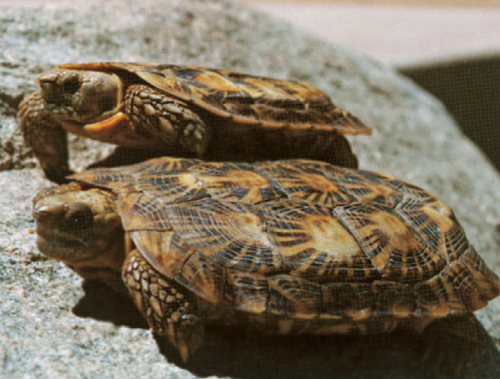
This Article From Issue
July-August 2010
Volume 98, Number 4
Page 356
DOI: 10.1511/2010.85.356
THE LAST TORTOISE: A Tale of Extinction in Our Lifetime. Craig B. Stanford. The Belknap Press of Harvard University Press, $23.95.
Tortoises are in trouble. After 65 million years of peaceful plodding, they’ve been overtaken by modern humans, who are destroying their habitat, abducting them as pets and consuming them as food and medicine. The result is an imminent mass extinction: Unless humans slow their depredations, the 45 tortoise species that remain will disappear permanently.

From The Last Tortoise: A Tale of Extinction in our Lifetime.
In The Last Tortoise, biologist Craig B. Stanford documents the dismaying scope of the crisis. Twenty-five tons of tortoises and turtles are exported from Sumatra every week, many bound for Chinese food markets, where the total trade in live turtles is estimated at $700 million a year. In East Africa, poachers invade nature reserves to pry exotic pancake tortoises (above) from their crevices for the pet trade. Those that survive the long trip to the pet store will succumb shortly afterward—92 percent of all imported turtles and tortoises are dead within three years of leaving the wild.
Stanford is best known for his fieldwork with chimpanzees, but his studies of the giant tortoises in the Mascarene and Galápagos islands have left him with an obvious affection for “perhaps the most astoundingly unlikely creatures in the history of life on planet Earth.” His reporting here is professional and remarkably thorough, but tinged with anger and sadness at the senselessness of the crisis.
“As always, both extinction and preservation from extinction are human issues, not animal issues,” he writes. “Without our impact on the Earth there would be no twenty-first century mass extinction looming. And now that it is upon us, we are the only salvation for those same victims.”
American Scientist Comments and Discussion
To discuss our articles or comment on them, please share them and tag American Scientist on social media platforms. Here are links to our profiles on Twitter, Facebook, and LinkedIn.
If we re-share your post, we will moderate comments/discussion following our comments policy.